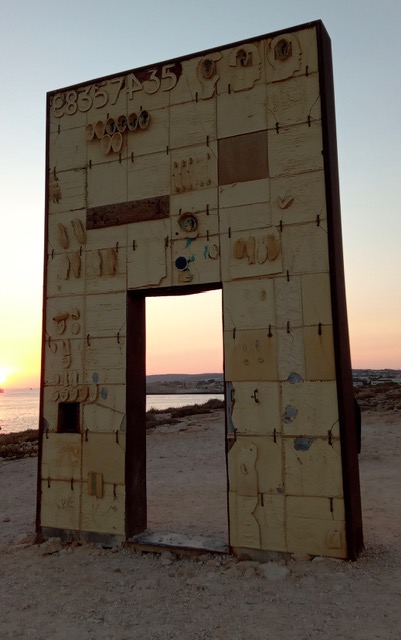
Porta d’Europa, Lampedusa. Foto di Patrizia Montagner
![]() Menti Migranti
Menti Migranti
Possiamo descrivere i fenomeni della migrazione- che seguono percorsi geografici e politici differenti- come caratterizzati da conflitti, diversità irriducibili, traumi inelaborati o ibridazioni che risultano minacciose per l’identità. Questi fenomeni dovuti anche ai processi di globaliazzazione, indicano la difficoltà sempre crescente della costruzione dei processi di soggettivazione sia negli individui che nelle varie popolazioni con le loro specifiche forme culturali.
Le esperienze che coivolgono migranti e rifugiati sono segnate da un’insicurezza sociale così profonda da frantumare i legami sociali e psichici. Legami strutturali e fondativi, che sono legati a una genealogia e una tradizione culturale con le sue basi mitologiche e che sembrano essere andati perduti. Una modifica in cui l’apertura delle “brecce” a livelli diversi è apparentemente colmata da associazioni aderenti e mimetiche, tanto solide quanto fragili, o da tentativi drammatici di “ristabilire” l’identità con toni deliranti.
Viviamo in un’età di precarietà simbolica, di “dislocazioni simboliche” che definiscono soggetti in cerca di una definizione identitaria da costruire, o di un gap esperienzale da colmare.
Come possiamo guardare questi cambiamenti alle radici stesse della soggettività, indotte dalle trasformazioni antropologiche accelerate e spesso tumultuose a cui assistiamo?
L’esperienza della migrazione e dell’accoglienza, che spesso si presenta altrettanto duramente nell’altro versante, mettono alla prova la capacità di elaborare queste trasformazioni ma possonoe essere anche un’occasione per aprire nuovi interrogativi e guardare le dinamiche intrapsichiche e gruppali da un altro vertice.
Questa nuova finestra vuole essere un contenitore di modelli di interpretazione di questi fenomeni e di descrizione delle varie esperienze che si stanno verificando nel mondo.
![]() Migrant minds
Migrant minds
We can understand the phenomena of migrations – which follow geographic and political paths – as being characterised by conflicts, irreducible diversities, unelaborate traumas or hybridisations owing to the identity threatening, confusing phenomena of globalisation. These phenomena also indicate the difficulty of constructing the processes of subjectivity in both the various populations, with their specific cultural forms, and the individual.
Experiences involving migrants and refugees are marked by a social insecurity that is capable of deeply affecting social and psychic ties. We live in an age of symbolic precariousness, of “symbolic dislocations”, which by its nature defines subjects in search of an identity definition to construct, or of an experiential gap to close, but also, for this same reason, subjects open to transformation.
How shall we look upon these changes to the very roots of subjectivity, induced by the accelerating and often tumultuous anthropological transformations of which we are becoming aware? Transformations which are imposing on the technical level, as they are deficient on the level of an adequate symbolisation, and which at times result in blind violence or in some kind of alexithymia that prevents any perception or emotional expression.
It is a true modification of the very structure of symbolic ties, happening in both the psychic and social processes, where the structural and founding bonds, which are linked to a genealogy and a cultural tradition with its myth foundations, seem to have been lost. A modification where the “breaches” opening at different levels are apparently bridged by adherent and mimetic associations, as solid as they are frail, or by real attempts to ’re-establish’ identity with delusional tones.
We want to open this category to study models of interpretation of these phenomena and to describe the various experiences that are taking place in the world.
